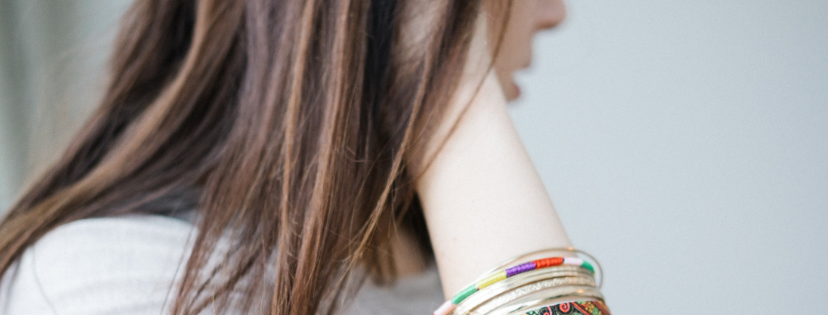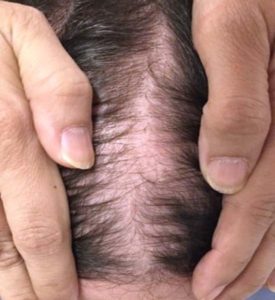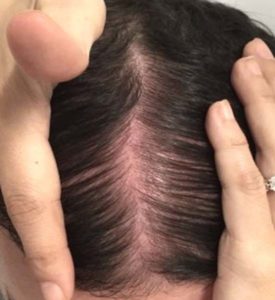 Menopause is a natural biological process that all women go through, usually in their 40s or 50s. During this time, the body adjusts to fluctuating hormone levels and the menstrual cycle ends. Along with that, women experience many other symptoms, such as hot flashes, changes in mood, changes in body fat distribution and sleep problems. Another common occurrence during menopause? Hair loss.
Menopause is a natural biological process that all women go through, usually in their 40s or 50s. During this time, the body adjusts to fluctuating hormone levels and the menstrual cycle ends. Along with that, women experience many other symptoms, such as hot flashes, changes in mood, changes in body fat distribution and sleep problems. Another common occurrence during menopause? Hair loss.
Dr. Lady Dy of Dy Dermatology Center in Glenview, Illinois, specializes in hair loss treatments. Patients from across the country seek her services—including women who are experiencing hair loss from menopause.
Hair loss is often disheartening to those who experience it. Many are too embarrassed to talk about it or assume that there is no treatment. Dr. Dy educates women on menopause, how it changes their bodies, and what she can do to help.
An overview of menopause
Menopause is officially diagnosed in women after they have not experienced a menstrual period for more than one year. The age women experience it varies, but the average age in the U.S. is 51. You will experience many symptoms during menopause, which are caused by a decreased production of estrogen and progesterone in your ovaries.
In the months or years leading up to menopause (perimenopause), you might experience these signs and symptoms:
- Irregular periods
- Vaginal dryness
- Hot flashes
- Chills
- Night sweats
- Sleep problems
- Mood changes
- Weight gain and slowed metabolism
- Thinning hair and dry skin
- Loss of breast fullness
While menopause is inevitable, there are ways to manage symptoms. To learn more about menopause, visit the Mayo Clinic website.
While all of the symptoms caused by menopause can be difficult to deal with, Dr. Dy specializes in treating women who experience hair loss.
Menopause and hair loss
Everyone’s hair loses volume over the years, so it’s not uncommon for hair to be thinner by the time women approach menopause; however, menopause accelerates the hair loss process.
The pattern of menopausal hair thinning is similar to the early stages of male pattern hair loss. Most commonly, the first sign of hair loss if a gradual thinning of individual strands of hair, thus loss of volume. The next steps are usually a receding pattern along the front hairline and along the temples. As this hair loss process happens, you will probably notice hair falling out in large clumps during washing, brushing, and drying.
The role of hormones
Remember, all of these changes you experience during menopause—including hair loss—are triggered by hormone changes.
Estrogen, Progesterone and Androgens
Estrogen and progesterone hormones keep your hair in the growing phase; the longer the growing phase, the longer and healthier your hair can grow. When your levels of estrogen drop, the growth cycle of your hair shortens and hairs shed before it reaches its maximum length.
A decrease in estrogen and progesterone also triggers an increase in the production of androgens, or a group of male hormones. Androgens do not decrease your number of scalp hairs; they miniaturize the hair bulbs, causing a reduction in the volume or body of your hair overall. So, your hair may not be falling out more or failing to grow back, but the hairs growing in to replace the lost ones are thinner and weaker.
Treatment for hair loss
Dr. Dy specializes in treating hair loss and she works with each patient to choose a treatment plan that will work best for their situation. Here’s a few of the different treatments she offers to her patients:
Hormone Replacement Therapy (HRT)
Using HRT, patients take female hormones—typically estrogen and progestin together—through creams, a pill, or a patch to help restore estrogen levels and slow hair loss. Hormone Replacement Therapy isn’t an option for every patient, so it is crucial that you meet with your physician and gynecologist to talk if you are interested in taking this route. Because not everyone is a candidate for HRT, Dr. Dy offers other hair growth treatment options.
PRP Treatments
During platelet-rich plasma (PRP) treatments, a thin needle is used to draw your own blood, which is then injected into your scalp across the thinning area to regrow hair using the plasma from the blood. Your blood harvests growth factors that is found in the plasma, which helps stimulate hair growth. See before and after pictures below.


LED Light Therapy
Laser light therapy consists of utilizing the visible red light generated in a laser diode. It promotes hair growth by increasing blood and circulation thus, stimulating hair follicle growth.
Micro Needling Treatment
Dr. Dy uses the only FDA-approved skin pen, which creates microchannels in the surface of the scalp using tiny needles and layers it with growth factor protein molecules. The micro trauma to the skin, combined with the the peptide molecules, work to stimulate hair growth. Multiple scheduled treatments are typically recommended—Dr. Dy will outline a plan designed for you, depending on the stage of your hair loss.
Vitamin supplementation
There are multiple combinations of supplements that can be utilized to successfully promote hair growth and lessen hair loss. Some of the supplements Dr. Dy suggests are hydrolyzed collagen, iron, saw palmetto, ashwagandha root, silica, and fish oil.
Medications
There are oral prescription drugs, as well as topical prescriptions and growth factors and peptide serums. It is best to discuss these options with Dr. Dy, so that she can give you a proper assessment and recommendation.
If you are experiencing hair loss from menopause, you certainly aren’t alone. Not only do you have millions of women on your side, but also Dr. Lady Dy, who will work with you to tackle your hair loss concerns.

Dr. Lady Dy is one of the most sought after dermatologists in the United States. She has studied all over the world and has worked with the world’s leading experts in skin and hair. Her patients fly from all over North America, Dubai, Norway and Korea to be treated by her in Chicago. To learn more about treatments for hair loss, contact Dy Dermatology Center. Click here to request an appointment or call the dermatology center at (847) 832-1185.
